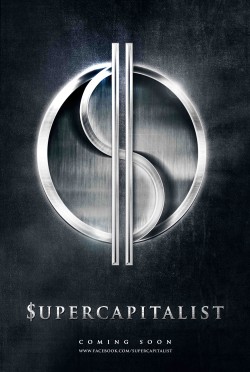$upercapitalist

Having heard little about $upercapitalist besides its title and the fact it was set in Hong Kong, I’d idly speculated it might be a corny comic-book action flick with $upercapitalist opposed to his arch-enemy, Chairman Mao; I was agnostic as to which was supposed to be the good guy. As it turned out, I did get the corny part right: it’s a straightforward hacked-out financial potboiler — the cheap, Chinese knock-off of Wall Street.
Conner Lee (writer Derek Ting) was a prodigy — perfect scores on his SATs, valedictorian of his class, admitted to M.I.T. — until he dropped out and took a job on Wall Street, which he goes to after back-alley dice games. We learn just how good he is when he contradicts his boss about a big trade and wins; passing dialogue tells us that nobody could have predicted that day’s particular turn of the market. Nobody, that is, but Conner.
This catches the eye of Mark Patterson (Linus Roache), who somehow knows a lot about Conner’s deceased father. Mark offers Conner a job in Hong Kong at a branch of his hedge fund, Supercapitalist. Conner shows up and makes contact with Quentin Wong (Darren E. Scott), who introduces Conner to the good life, Hong Kong style.
The bulk of the story concerns a Chinese manufacturing and shipping company under the control of a family triumvirate: Donald Chang (Richard Ng), his older brother Victor (Kenneth Tsang), and his son, Richard (Eugene Kang). The company is hemorrhaging money, and Conner wants to make some cuts to nurse it back to health, but the company’s leadership is less than amenable to his suggestions.
We can pretty much see the direction it goes from here: Conner pushes up against the locals, meets the girl (Kathy Uyen) who helps him see the error of his — and his company’s — ways, and he switches allegiances in time to save the company from the mean old hedge fund investors.
Look, I sympathize with the desire to call out Wall Street investors as arrogant, greedy jerks. I’m sure that many — if not most — of them are. And I’m sure that Ting did lots of research, but the story is still a one-dimensional morality play. Films like Margin Call show that there are, indeed, other, more nuanced stories to be told about financial market traders, and they don’t even have to defend the traders.
And then there’s the dialogue, which consists almost exclusively of clichés. Ting is an actor first and foremost, and he knows how great it feels to deliver a big, meaty chunk of dialogue punctuated with a nice, resonant line. But when that’s all we see it gets ridiculous, and fast. It’s even worse when the clichés are ones we’ve heard so many times before that they’ve already turned into punch-lines.
The characterization is pretty much the same. We know that Conner is good because he relates well to a cute kid; we know that Quentin is bad because he roughs up a beggar; and we know that the traders are arrogant and greedy because they snort cocaine off the backs of hookers. I am absolutely serious about that.
It’s hard to tell whether it’s the script’s fault or the cast’s, or first-time director Simon Yin’s, but the acting is pretty amateurish as well. Only Roache’s performance felt truly convincing, echoing a long-distance Gordon Gekko right down to the hair. Everyone else is varying degrees of wooden.
I understand that the movie was put together on a shoestring half-million dollars. And, in a way, it’s impressive what they’ve been able to pull off on such a limited budget. But objectively it’s just not up to snuff.
Worth It: no.
Bechdel Test: fail.

Trackbacks